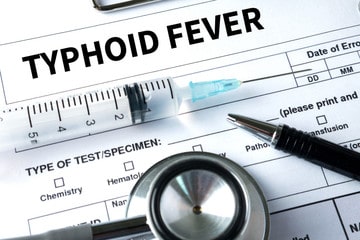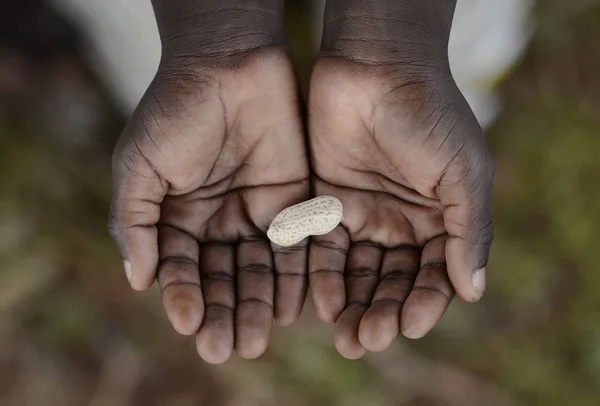Typhoid is a bacterial disease caused by Salmonella typhi. The disease is quite rare in developed countries but prevalent in developing countries, causing numerous deaths annually. Typhoid is a prevalent disease in Nigeria. In fact, the typhoid statistics in Nigeria are estimated to be over six million cases per year. [1]
The reason for the prevalence of typhoid in developing countries, like Nigeria, is mostly due to poor sanitation and unsafe drinking water. Salmonella typhi – the bacteria causing typhoid is usually transmitted from persons to persons via the fecal-oral route. As such, where there are poor sanitation and waste management such as in developing countries – typhoid will be prevalent. [2]
Symptoms of Typhoid

Typhoid like every other disease comes with a group of symptoms which can be used to diagnose it. These symptoms include:
- Headache
- Fever
- Weakness and fatigue
- Sweating
- Muscle ache
- Loss of appetite
- Diarrhea
- Constipation
- Rashes.
Typhoid can be treated using antibiotics and can be cured within a few days, as you will still learn. There, however, may be complications in some cases which could lead to death. [3]
Prevention of Typhoid in Nigeria
When it comes to prevention, the best ways to prevent Salmonella typhi from ever getting into your body is by practicing good personal hygiene, and proper waste disposal.
Personal hygiene
• Wash your hands after using the toilet
Typhoid is caused by the bacteria, which can only be transmitted from an infected person’s feces into another’s body through the mouth.
The fecal-oral route may sound disgusting and very unlikely, but in reality, it happens oftener than we can imagine mostly due to poor personal hygiene. For instance, when an infected person uses the toilet and do not wash properly, the bacteria could be transmitted to the food he/she handles and eventually into your digestive system.
This also could happen to parents who handle infected children without properly washing their hands before touching foods.
Washing your hands properly after using the toilet, playing with kids, or just from a crowded public area is your best option when it comes to preventing typhoid. If you find it inconvenient using soap and water and water to wash your hands regularly, you may want to go about with a hand sanitizer which is often made of about 60% alcohol which can kill salmonella typhi and a host of other bacteria.
• Keep all food covered.
Flies are carriers of salmonella typhi. When a fly visits the toilet or any other waste dump, the hairs on their body becomes magnet on which the bacteria attach itself to, and when they land on uncovered foods, they contaminate it.
As such, after cooking, ensure all foods are well covered, and if you can eat al foods while they are still hot as the heat from foods can kill the bacteria.
• Avoid eating food from roadside vendors.
More than half of the person who eats foods from roadside vendors invariably develops one digestive system related problems.
The truth is it’s challenging for roadside vendors to keep their foods free of contamination for a very long time. Eating foods from these vendors increases your chance of getting typhoid fever, and if you must ensure all foods are properly covered and served hot.
• Wash all vegetables properly
Most vegetables such as lettuce are in constant contact with the soil before they are harvested. This, of course, means that they will become contaminated with various disease-causing organisms.
As such, when you purchase your vegetables from the market, ensure you wash them properly before use, or better still wash them in hot water to kill off and microorganism.
• Peel or wash fruits properly
Fruits like vegetables are easily contaminated and as such wash them properly before eating them and if you don’t have access to clean water to wash them, then peel and if you cannot peel, then forget about eating the fruit.
• Boil water before drinking
Contaminated water is the leading cause of typhoid in Nigeria. In rural areas where people rely on open sources such as rivers and streams for drinking water, the chances of contracting typhoid is very high since these water passes through long routes carrying dirt and debris along the way.
To make any water safe for drinking, you should bring it to boil for a few minutes and then allow it to cool before drinking. Also, if you can, then drink water from only treated sources such as bottled or sachet water.
Proper waste management
• Keep the toilet door closed at all times
The toilet is the point where infected persons can deposit the bacteria, causing typhoid. As such, you’ll do well to keep it as clean as possible. Always make sure the toilet is clean at all times and keep flies away by using air fresheners and antiseptics.
• Avoid defecating in the open
Defecating in the open is a major cause of typhoid cases in developing countries like India, where the practice is prevalent. Defecating in the open makes it easier for flies to come in contact with the bacteria and then contaminate foods and water.
Typhoid Treatment in Nigeria

Typhoid is usually treated by the medications, use of IV fluids, and oral rehydration therapy. Most people also seek for typhoid herbs in Nigeria for treatment.
Some common and effective typhoid drugs in Nigeria include:
- Ciprofloxacin
- Azithromycin
- Ceftriaxone
- Ampicillin
- Cipro I.V.
It is advised that you consult your doctor first, so he can prescribe the right medication for you to treat typhoid. [4]
Is there a Typhoid Vaccine in Nigeria?
There are two types of vaccines available; the inactivated (killed) injectable vaccine which lasts for 2 to 3 years and the live, weakened oral vaccine which lasts for 5 to 7 years. Your doctor will guide you on the one you should take. [5]
Common types of typhoid vaccines include: Tybar, Hepatyrix, Typhoid vi, ViATIM, Vax-Tyvi, Typhim VI, Typherix, Ty21a oral vaccine, Vivotif, and Tyvivac, which is the typhoid vaccine available in Nigeria.
Tyvivac was endorsed and approved by the National Agency for Food and Drug Admistration and Control (NAFDAC) in 2014. [6]
Tyvivac will give you protection from typhoid for only 3 years. The price of the Tyvivac vaccine in Nigeria ranges from 3,000 to 5,000 naira.
ALSO READ:
Kwashiorkor: Causes, Symptoms and Treatment.
Collins Nwokolo is a human physiologist, writer and health enthusiast. He loves writing helpful articles on health and fitness, which he enjoys sharing with everyone.






